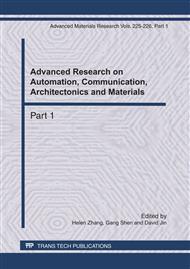p.678
p.684
p.688
p.692
p.697
p.701
p.706
p.710
p.714
A Novel Optimization Scheme Based on QoS in Wireless Networks
Abstract:
There has been explosive demand for supporting multi-class traffic, especially bandwidth-intensive multimedia traffic in wireless networks. The ability to manage bandwidth to cope with wireless network resource fluctuations is becoming increasingly important. In this paper, we propose an efficient Call Admission Control (CAC) scheme that relies on adaptive and dynamic resource reservation strategy for multi-class service wireless networks. Extensive simulation experiments have been conducted to evaluate the performance of the proposed scheme. Results show that our proposed adaptive scheme is effective in guaranteeing QoS requirements by keeping the call blocking and handoff dropping probabilities substantially low.
Info:
Periodical:
Pages:
697-700
Citation:
Online since:
April 2011
Authors:
Price:
Сopyright:
© 2011 Trans Tech Publications Ltd. All Rights Reserved
Share:
Citation:


